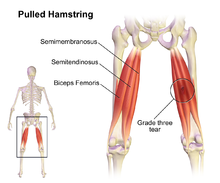Hamstring Tear – Muscle Tear
What is it?
A muscle tear is literally a tearing of the muscle fibres. This is caused by a stretching of the muscle further than normal capacity resulting in damage to the muscle.
How does it happen?
There are hundreds of muscles in your body each made up of interlocking fibres called filaments that slide past each other. A sudden stretch or hit on the hamstring muscle can cause these filaments to break resulting in a tear in the muscle.
What do they feel like?
It is common for us all to feel achiness in our muscles during and/or after exercise. A hamstring muscle tear usually feels like a sudden sharp pain in the back of your thigh. It can occur when you are trying to over-stretch eg stretching out to kick a ball or hit a shot, or a sudden lengthening in the muscle eg slipping down a ramp. This tearing of the fibres can cause swelling, bruising and stiffness with immediate pain. Most people are unable to use the muscle initially causing a limp.
How are they diagnosed?
Your physiotherapist is likely to diagnose a muscle tear by listening to your symptoms and how the injury occurred. They will assess the area of pain, feel if there is a hole in the muscle, do some resisted muscle testing and look and feel for signs of inflammation. Generally further you won’t need investigations but sometimes ultrasound scans may be helpful to determine the severity of the tear. Specific imaging later in the rehab process can guide return to sport or work if this is delayed.
What should I do if I have torn my muscle?
When you first injure yourself it is important to use ‘RICE’.
- Rest: Stop playing sport, walking, or using the body part and sit or lie down.
- Ice: Ice the painful area with a bag of ice wrapped in a towel, or an ice pack for 48 hours. For more tips on icing check out this blog on how to ice.
- Compression: See your physiotherapist or local pharmacist for a compression bandage or tubigrip.
- Elevation: Elevate the area to help decrease inflammation. See your physiotherapist as soon as possible.
What can Back in Action do to help?
Here at Back In Action we can determine the extent of your injury, set goals for your rehabilitation and give you approximate time frames for your recovery. If you have just injured your muscle we can help with pain management and modifying your lifestyle without causing further or new injuries. After the acute stage (the first 48 hours) the first priority is making sure you have full movement in your joints and help with swelling reduction. We may use mobilisations, massage, acupuncture or other techniques to help with this. Next, rehab involves gradually rebuilding your strength and agility and looking at the whole kinetic chain to correct any compensations that have occurred to get you back to where you want to be better, faster.

